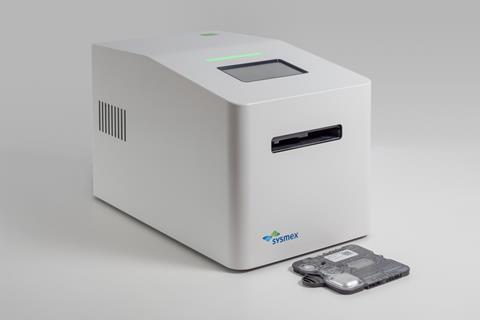The Longitude Prize on AMR launched in 2014 – funded by Nesta – to incentivize the creation of new diagnostic tests that, in a matter of minutes, can identify whether an infection is bacterial, and if so, the right antibiotic to prescribe to slow the spread of antibiotic resistant infections. The goal is to replace the 2-3 day lab test process that doctors and patients must currently endure, and end “just in case” prescribing that is prevalent as a result which promotes the development of antibiotic resistance.
Innovative diagnostic test
The PA-100 AST System is an innovative diagnostic test based on technology from Uppsala University in Sweden. The test will transform the treatment of urinary tract infections and brings the power of laboratory testing into a doctor’s office.
Using a 0.4CC (400µl) sample of urine on a smartphone-sized cartridge, the test can identify the presence of a bacterial infection in just 15 minutes and accurately identify the right antibiotic to treat it within 45 minutes. This supports health workers in their clinical decision making at the point of care, and opens up the significant possibility of previously “retired” first-line antibiotics coming back into use for the majority of patients.
Betsy Wonderly Trainor, Alliance director at CARB-X (Boston University) and Longitude Prize judge said: “This test would support healthcare professionals to make well-informed decisions at primary care facilities rather than only in health settings with available laboratories. By increasing access to diagnostics, we can significantly improve our ability to address antibiotic resistance, helping clinicians select appropriate treatment more efficiently.”
Special envoy
Dame Sally Davies, UK Special Envoy on Antimicrobial Resistance, former Chief Medical Officer of England and Longitude committee member said:
“Without antibiotics, modern medicine as we know it is in real danger of collapse. Every day, healthcare workers make urgent clinical judgements for the good of their patients, but we can no longer afford ‘just-in-case’ prescribing of antibiotics. The Longitude Prize winner lays the groundwork for a sea-change in how we manage these precious medicines, where healthcare workers are supported with rapid and relevant diagnostic tests to make the best decisions for their patients with confidence that they are prescribing the right drug, first time.”
In 2019, antibiotic resistant infections directly killed 1.3m people around the world and contributed to the deaths of 5m in total. By 2050 it is predicted antibiotic resistant infections will cause 10m deaths annually. The World Bank estimates antibiotic resistance could result in $1tn in additional health costs by 2050 and up to $3.4tn in lost GDP by 2030.
In the USA, up to 6% of all healthcare visits (about 7m a year) are UTI-related, costing the US healthcare system $1.6bn. In 20-30% of sepsis patients, the infection originates from the urinary tract, and urosepsis often develops from UTIs - up to two in five people that develop severe sepsis will lose their lives. One recent California-based study found over half (57%) of UTIs were caused by bacteria resistant to at least one antibiotic.
Tiny channels
Mikael Olsson, CEO and co-founder, Sysmex Astrego, winners of the Longitude Prize on AMR said: “The PA-100 AST System challenges bacteria present in a patient’s urine with microscopic quantities of antibiotics in tiny channels embedded in a cartridge the size of a smartphone. We rapidly pinpoint whether a bacterial infection is present and identify which antibiotic will actually kill the bugs, guiding doctors only to prescribe antibiotics that will be effective. The $10m prize will support us to tailor the test for use with different kinds of UTIs and antibiotics, speeding up access for more patients.”
The cartridge, containing a nanofluidic chip, is inserted into an analyzer unit – about the size of a shoebox – which reads the chip sample at a cellular level. Designed to work in doctor’s offices, the analyzer unit is fully automatic and maintenance free. It is the first time a point-of-care test is capable of identifying a specific infection and its susceptibility to specific drugs by observing how the patient’s infection responds in real-time to different antibiotics (a phenotypic test).
Since the PA-100 AST System identifies which specific antibiotic can treat an infection, it will likely allow retired antibiotics to be brought back into service because the test is able to demonstrate when an infection is susceptible to their effects.
Transformational tech
The winning test paves the way for a future where the PA-100 AST System and similar technologies can transform infection diagnosis and treatment beyond UTI, through, for example, blood and sputum (saliva) tests to detect other infections.
The Longitude Prize on AMR is designed and delivered by Challenge Works – a Nesta enterprise. For more than a decade, Challenge Works has run 86 prizes, distributed $158 million in funding and engaged with 13,500 innovators across prizes tackling major health challenges, frontier technology, global sustainability and social impact. Challenge Prizes offer a large reward to incentivize the development of breakthrough innovations to tackle challenges where solutions have not been forthcoming.
Tris Dyson, Managing Director, Challenge Works said: “We launched the Longitude Prize on AMR to create the urgent pull needed to get innovators working on one of the biggest life-and-death challenges facing humanity. Hundreds of teams competed, with multiple solutions now close to market thanks to the prize. I want this to be the start of a revolution in healthcare where rapid point of care diagnostics become a mainstay of medicine - creating a future where patients can quickly and accurately get a diagnosis and the correct treatment when they visit the doctor. The success of the Longitude Prize on AMR opens the door for many more prizes to tackle massive global challenges. Today’s news proves that, when there is a challenge of gargantuan proportions in desperate need of real-world solutions, prizes attract the brightest minds to solve the problem and leave a legacy of successful, growing businesses in their wake.”








No comments yet